#economic vultures
Text
BBC News: G7 Summit: Africa seeks new role as nations eye its resources
BBC News - G7 Summit: Africa seeks new role as nations eye its resources
minutes

Resources such as Democratic Republic of Congo's cobalt are in huge global demand because of their use in electric vehicle batteries
Africa will not accept that it "should just continue to be a source of raw materials" for the rest of the world, the African Union's Trade Commissioner has told the BBC.
Albert Muchanga says instead his continent wants a future of "genuine and mutually beneficial relationships" with its trade partners.
It comes as the AU's chair has been invited to the G7 summit in Japan amid intensifying competition with China for Africa's natural resources.
With Western powers seeking greater trade links with the continent, there have been visits to a host of African countries in the run-up to the summit from the leaders of France and Germany, as well as the US vice-president.
Japan's Prime Minister Fumio Kishida visited Egypt, Ghana, Kenya and Mozambique at the start of this month as he sought to bolster African support for his efforts to counter Chinese and Russian influence on the continent, as well as in regards to Taiwan and Ukraine.
Speaking in Maputo on 4 May he said: "Many countries of the so-called Global South are hurt and suffering from high food and energy prices. The cause of this issue should be traced to Russia's invasion of Ukraine."
Mr Muchanga welcomes the recognition of Africa's problems. He says the disruption caused by the Covid pandemic is also to blame for problems that are "multi-dimensional".
"It's a recognition of that the North and the South want deeper interdependence, and it's welcome."
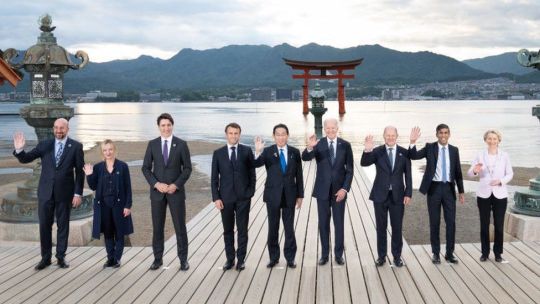
Several G7 leaders have visited Africa in recent weeks as they seek to strengthen cooperation on a range of global challenges
The Zambian official says that with the era of colonialism now in the past, Africa wants to get more benefit from that relationship by equipping itself with the skills to keep more of the economic value from its vast natural resources.
"We are not going to continue as the historical sources of raw materials. It will not work because of a growing population, which wants opportunities for decent jobs, and that can only come from the processes of manufacturing and agro-processing," he says.
"A good example has been given by DRC and Zambia, when they're going to come up with a joint project on the production of batteries for electric vehicles." The two countries are major exporters of the copper and cobalt needed for the batteries, which are in growing demand around the world.
US-China rivalry
The United States is trying to boost its trade ties with Africa as it seeks to tackle climate change. During a visit to Tanzania in March, Vice-President Kamala Harris highlighted a project which will benefit from US financing, which she said was a "first-of-its-kind processing facility on the continent for minerals that go into electric vehicle batteries".
"Importantly, raw minerals will soon be processed in Tanzania, by Tanzanians. It will help address the climate crisis, build resilient global supply chains, and create new industries and jobs."
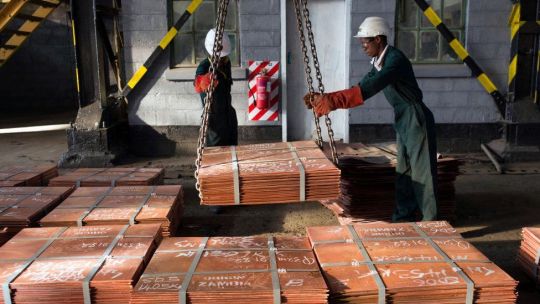
Demand for products such as Zambia's copper has led other countries to focus on increasing trade with Africa
Last year, China's trade relationship with Africa reached a record $282bn (£226bn), according to Chinese customs data. That marked an 11% increase from the year before as prices for commodities such as oil, copper, cobalt and iron ore surged. It also means Africa-China trade is nearly four times as big as US-Africa trade, which came in at $72.6bn.
However "more manufactured and value-added products are shipped to the US than are shipped to China", according to Florizelle Liser, who runs Corporate Council on Africa, a Washington-based organisation that aims to boost US-Africa trade.
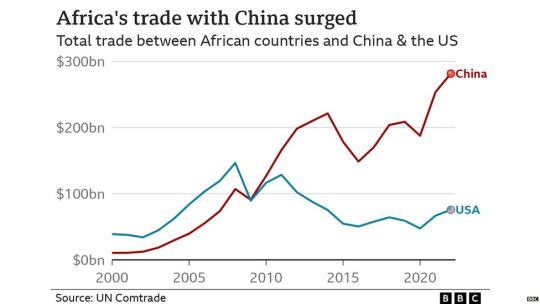
China has become Africa's largest trading partner since it joined the World Trade Organisation in 2001
Ms Liser adds that Africans "whether in government or the private sector really do like working with US companies for a variety of reasons. They liked the American brand."
"They liked the fact that working with the Americans, often there's more transparency in the relationship. And they also like the fact that US companies do a lot in terms of skills transfer, and in technology transfer, and they don't necessarily see this with all the other partners, China as well as others."
China debt concerns
That lack of transparency in trade relations was criticised recently by outgoing World Bank President David Malpass, who told the BBC he was concerned about the long-term implications of Chinese loans to Africa and called for international financial support to be more transparent.
Billions of dollars have been spent on projects such as ports, railways and electricity grids. Despite the economic benefits, it has left countries including Ethiopia, Ghana and Zambia struggling to repay their debts amid claims that China is using them as leverage for political influence to support its demand for natural resources.
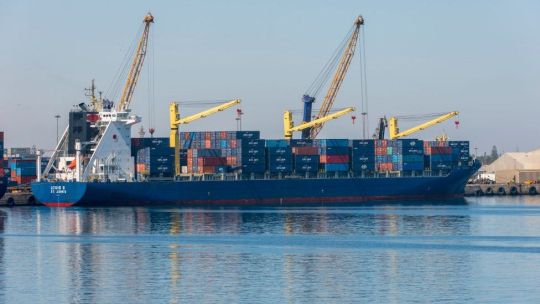
China funded the construction of ports such as Walvis Bay in Namibia which have allowed the export of natural resources
During a visit to Beijing by Gabon's president last month, China's Vice-Foreign Minister Deng Li denied that was the case, saying: "We are not bringing a so-called 'debt trap'. We are bringing development opportunities. We have never attached any political strings to our aid and economic assistance to African countries."
The African Union's Mr Muchanga says: "China has really done quite a considerable job in promoting infrastructure deployment across Africa through the Belt and Road Initiative."
However he says transparency in trade relations is very important. "There should be no hidden clauses. Unfortunately, there have been hidden clauses in the past."
He adds that "at the negotiating table before the deal is signed, everybody should be very clear on what they're signing on. I think that's the lesson that we need to take into the future."
One way Africa is trying to strengthen its hand in trade deals is through the development of the African Continental Free Trade Area. The flagship project of the African Union is aimed at eliminating trade barriers and boosting trade within the continent but has yet to be fully implemented.
"The next stage is to move it to an African Customs Union," explains Mr Muchanga, who hopes that eventually AfCFTA will allow its 54 members to strengthen its negotiating hand with the rest of the world on trade in a similar manner to the European Union.
Mr Muchanga says that the AU's invitation to the G7 summit is "a recognition of the systemic influence of Africa to the global economy".
"Africa should really be able to speak very strongly with one voice on all global economic issues."
#G7 Summit: Africa seeks new role as nations eye its resources#environmental disasters#scavengers#African Resources#stolen legacy#china#vampire debt#economic vultures#African economy#G7
1 note
·
View note
Text
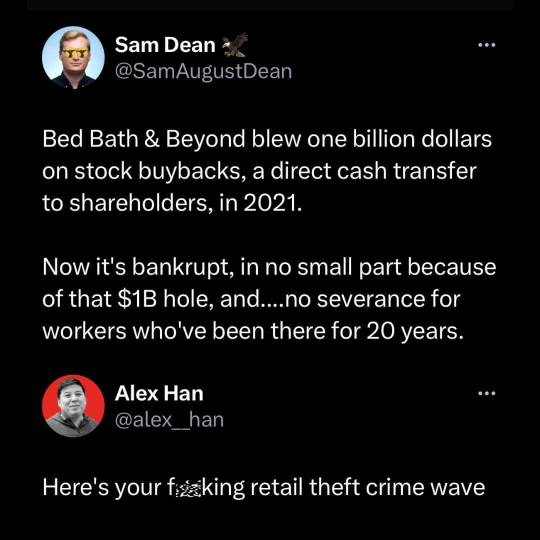
Corporate crime dwarfs retail crime.
1K notes
·
View notes
Link
It’s not obvious to me why venture capitalists should be so in control of what tech gets funded, who designs it, how it gets developed, why it gets deployed, and where the returns go. If it is simply a question of capital, we can and should explore alternatives to the privately run VC system prioritizing tech that degrades and commodifies more of our life, gambles on these developments with other people’s money, and in the blink of an eye causes regular panics that threaten to upend life for countless people. If it is a question of talent, we can and should recognize that these people are not any smarter or more talented than us—they just have more capital to throw at problems, better connections to ensure things work out their way, and less shame preventing them from pursuing what they want. If it is a question of politics, then we should ask whether a system that subsidizes a bunch of well-connected, wealthy libertarians as they enrich one another with lottery tickets is truly the only way we can and should develop technology. I hope not.
#silicon-valley#finance#article#bank run#vulture capitalism#VC#tech bros#technology#economy#economics#Silicon Valley Bank
10 notes
·
View notes
Video
youtube
Peter Boyle | The Rise And Fall Of Blitzscaling!
#politics#the left#economics#capitalism#late capitalism#late stage capitalism#silicon valley#venture capital#vulture capitalism#video#youtube
9 notes
·
View notes
Quote
Raising my hand, I propose that Ulitsa Sezam could feature, for example, a segment showing children running a lemonade stand as a way of teaching about business and teamwork.
The group is horrified — not only by the idea of children selling items on the street but also at the thought of showing children engaged in what one participant calls “dirty mercantile activities.” “Only desperate, poor people sell stuff on the street to survive and it’s dangerous,” one educator argues. Another admonishes, “It’s not right to show children trying to earn money — it encourages individual greed.” I hadn’t anticipated my example would provoke such reactions. Of course, though, it makes sense — in Soviet times, selling items on the street was illegal, and only the poorest Russians or Mafia resorted to street commerce.
Adapting Sesame Street for Russian TV — What Could Go Wrong?
#sesame street#russia#soviet union#economics#capitalism#tv#history#Natasha Lance Rogoff#vulture#literature#book excerpt
0 notes
Text
How to shatter the class solidarity of the ruling class
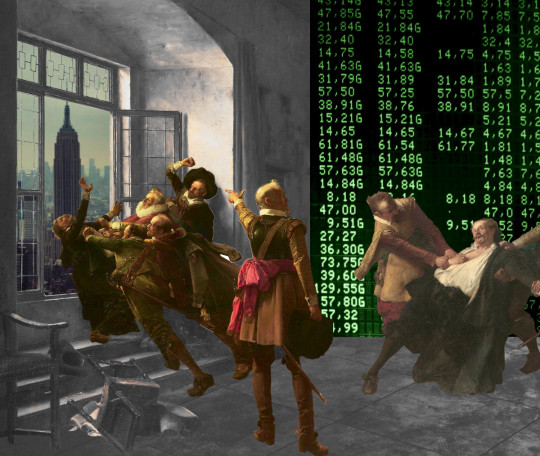
I'm touring my new, nationally bestselling novel The Bezzle! Catch me WEDNESDAY (Apr 11) at UCLA, then Chicago (Apr 17), Torino (Apr 21) Marin County (Apr 27), Winnipeg (May 2), Calgary (May 3), Vancouver (May 4), and beyond!

Audre Lorde counsels us that "The Master's Tools Will Never Dismantle the Master's House," while MLK said "the law cannot make a man love me, but it can restrain him from lynching me." Somewhere between replacing the system and using the system lies a pragmatic – if easily derailed – course.
Lorde is telling us that a rotten system can't be redeemed by using its own chosen reform mechanisms. King's telling us that unless we live, we can't fight – so anything within the system that makes it easier for your comrades to fight on can hasten the end of the system.
Take the problems of journalism. One old model of journalism funding involved wealthy newspaper families profiting handsomely by selling local appliance store owners the right to reach the townspeople who wanted to read sports-scores. These families expressed their patrician love of their town by peeling off some of those profits to pay reporters to sit through municipal council meetings or even travel overseas and get shot at.
In retrospect, this wasn't ever going to be a stable arrangement. It relied on both the inconstant generosity of newspaper barons and the absence of a superior way to show washing-machine ads to people who might want to buy washing machines. Neither of these were good long-term bets. Not only were newspaper barons easily distracted from their sense of patrician duty (especially when their own power was called into question), but there were lots of better ways to connect buyers and sellers lurking in potentia.
All of this was grossly exacerbated by tech monopolies. Tech barons aren't smarter or more evil than newspaper barons, but they have better tools, and so now they take 51 cents out of every ad dollar and 30 cents out of ever subscriber dollar and they refuse to deliver the news to users who explicitly requested it, unless the news company pays them a bribe to "boost" their posts:
https://www.eff.org/deeplinks/2023/04/saving-news-big-tech
The news is important, and people sign up to make, digest, and discuss the news for many non-economic reasons, which means that the news continues to struggle along, despite all the economic impediments and the vulture capitalists and tech monopolists who fight one another for which one will get to take the biggest bite out of the press. We've got outstanding nonprofit news outlets like Propublica, journalist-owned outlets like 404 Media, and crowdfunded reporters like Molly White (and winner-take-all outlets like the New York Times).
But as Hamilton Nolan points out, "that pot of money…is only large enough to produce a small fraction of the journalism that was being produced in past generations":
https://www.hamiltonnolan.com/p/what-will-replace-advertising-revenue
For Nolan, "public funding of journalism is the only way to fix this…If we accept that journalism is not just a business or a form of entertainment but a public good, then funding it with public money makes perfect sense":
https://www.hamiltonnolan.com/p/public-funding-of-journalism-is-the
Having grown up in Canada – under the CBC – and then lived for a quarter of my life in the UK – under the BBC – I am very enthusiastic about Nolan's solution. There are obvious problems with publicly funded journalism, like the politicization of news coverage:
https://www.theguardian.com/media/2023/jan/24/panel-approving-richard-sharp-as-bbc-chair-included-tory-party-donor
And the transformation of the funding into a cheap political football:
https://www.cbc.ca/news/politics/poilievre-defund-cbc-change-law-1.6810434
But the worst version of those problems is still better than the best version of the private-equity-funded model of news production.
But Nolan notes the emergence of a new form of hedge fund news, one that is awfully promising, and also terribly fraught: Hunterbrook Media, an investigative news outlet owned by short-sellers who pay journalists to research and publish damning reports on companies they hold a short position on:
https://hntrbrk.com/
For those of you who are blissfully distant from the machinations of the financial markets, "short selling" is a wager that a company's stock price will go down. A gambler who takes a short position on a company's stock can make a lot of money if the company stumbles or fails altogether (but if the company does well, the short can suffer literally unlimited losses).
Shorts have historically paid analysts to dig into companies and uncover the sins hidden on their balance-sheets, but as Matt Levine points out, journalists work for a fraction of the price of analysts and are at least as good at uncovering dirt as MBAs are:
https://www.bloomberg.com/opinion/articles/2024-04-02/a-hedge-fund-that-s-also-a-newspaper
What's more, shorts who discover dirt on a company still need to convince journalists to publicize their findings and trigger the sell-off that makes their short position pay off. Shorts who own a muckraking journalistic operation can skip this step: they are the journalists.
There's a way in which this is sheer genius. Well-funded shorts who don't care about the news per se can still be motivated into funding freely available, high-quality investigative journalism about corporate malfeasance (notoriously, one of the least attractive forms of journalism for advertisers). They can pay journalists top dollar – even bid against each other for the most talented journalists – and supply them with all the tools they need to ply their trade. A short won't ever try the kind of bullshit the owners of Vice pulled, paying themselves millions while their journalists lose access to Lexisnexis or the PACER database:
https://pluralistic.net/2024/02/24/anti-posse/#when-you-absolutely-positively-dont-give-a-solitary-single-fuck
The shorts whose journalists are best equipped stand to make the most money. What's not to like?
Well, the issue here is whether the ruling class's sense of solidarity is stronger than its greed. The wealthy have historically oscillated between real solidarity (think of the ultrawealthy lobbying to support bipartisan votes for tax cuts and bailouts) and "war of all against all" (as when wealthy colonizers dragged their countries into WWI after the supply of countries to steal ran out).
After all, the reason companies engage in the scams that shorts reveal is that they are profitable. "Behind every great fortune is a great crime," and that's just great. You don't win the game when you get into heaven, you win it when you get into the Forbes Rich List.
Take monopolies: investors like the upside of backing an upstart company that gobbles up some staid industry's margins – Amazon vs publishing, say, or Uber vs taxis. But while there's a lot of upside in that move, there's also a lot of risk: most companies that set out to "disrupt" an industry sink, taking their investors' capital down with them.
Contrast that with monopolies: backing a company that merges with its rivals and buys every small company that might someday grow large is a sure thing. Shriven of "wasteful competition," a company can lower quality, raise prices, capture its regulators, screw its workers and suppliers and laugh all the way to Davos. A big enough company can ignore the complaints of those workers, customers and regulators. They're not just too big to fail. They're not just too big to jail. They're too big to care:
https://pluralistic.net/2024/04/04/teach-me-how-to-shruggie/#kagi
Would-be monopolists are stuck in a high-stakes Prisoner's Dilemma. If they cooperate, they can screw over everyone else and get unimaginably rich. But if one party defects, they can raid the monopolist's margins, short its stock, and snitch to its regulators.
It's true that there's a clear incentive for hedge-fund managers to fund investigative journalism into other hedge-fund managers' portfolio companies. But it would be even more profitable for both of those hedgies to join forces and collude to screw the rest of us over. So long as they mistrust each other, we might see some benefit from that adversarial relationship. But the point of the 0.1% is that there aren't very many of them. The Aspen Institute can rent a hall that will hold an appreciable fraction of that crowd. They buy their private jets and bespoke suits and powdered rhino horn from the same exclusive sellers. Their kids go to the same elite schools. They know each other, and they have every opportunity to get drunk together at a charity ball or a society wedding and cook up a plan to join forces.
This is the problem at the core of "mechanism design" grounded in "rational self-interest." If you try to create a system where people do the right thing because they're selfish assholes, you normalize being a selfish asshole. Eventually, the selfish assholes form a cozy little League of Selfish Assholes and turn on the rest of us.
Appeals to morality don't work on unethical people, but appeals to immorality crowds out ethics. Take the ancient split between "free software" (software that is designed to maximize the freedom of the people who use it) and "open source software" (identical to free software, but promoted as a better way to make robust code through transparency and peer review).
Over the years, open source – an appeal to your own selfish need for better code – triumphed over free software, and its appeal to the ethics of a world of "software freedom." But it turns out that while the difference between "open" and "free" was once mere semantics, it's fully possible to decouple the two. Today, we have lots of "open source": you can see the code that Google, Microsoft, Apple and Facebook uses, and even contribute your labor to it for free. But you can't actually decide how the software you write works, because it all takes a loop through Google, Microsoft, Apple or Facebook's servers, and only those trillion-dollar tech monopolists have the software freedom to determine how those servers work:
https://pluralistic.net/2020/05/04/which-side-are-you-on/#tivoization-and-beyond
That's ruling class solidarity. The Big Tech firms have hidden a myriad of sins beneath their bafflegab and balance-sheets. These (as yet) undiscovered scams constitute a "bezzle," which JK Galbraith defined as "the magic interval when a confidence trickster knows he has the money he has appropriated but the victim does not yet understand that he has lost it."
The purpose of Hunterbrook is to discover and destroy bezzles, hastening the moment of realization that the wealth we all feel in a world of seemingly orderly technology is really an illusion. Hunterbrook certainly has its pick of bezzles to choose from, because we are living in a Golden Age of the Bezzle.
Which is why I titled my new novel The Bezzle. It's a tale of high-tech finance scams, starring my two-fisted forensic accountant Marty Hench, and in this volume, Hench is called upon to unwind a predatory prison-tech scam that victimizes the most vulnerable people in America – our army of prisoners – and their families:
https://us.macmillan.com/books/9781250865878/thebezzle
The scheme I fictionalize in The Bezzle is very real. Prison-tech monopolists like Securus and Viapath bribe prison officials to abolish calls, in-person visits, mail and parcels, then they supply prisoners with "free" tablets where they pay hugely inflated rates to receive mail, speak to their families, and access ebooks, distance education and other electronic media:
https://pluralistic.net/2024/04/02/captive-customers/#guillotine-watch
But a group of activists have cornered these high-tech predators, run them to ground and driven them to the brink of extinction, and they've done it using "the master's tools" – with appeals to regulators and the finance sector itself.
Writing for The Appeal, Dana Floberg and Morgan Duckett describe the campaign they waged with Worth Rises to bankrupt the prison-tech sector:
https://theappeal.org/securus-bankruptcy-prison-telecom-industry/
Here's the headline figure: Securus is $1.8 billion in debt, and it has eight months to find a financier or it will go bust. What's more, all the creditors it might reasonably approach have rejected its overtures, and its bonds have been downrated to junk status. It's a dead duck.
Even better is how this happened. Securus's debt problems started with its acquisition, a leveraged buyout by Platinum Equity, who borrowed heavily against the firm and then looted it with bogus "management fees" that meant that the debt continued to grow, despite Securus's $700m in annual revenue from America's prisoners. Platinum was just the last in a long line of PE companies that loaded up Securus with debt and merged it with its competitors, who were also mortgaged to make profits for other private equity funds.
For years, Securus and Platinum were able to service their debt and roll it over when it came due. But after Worth Rises got NYC to pass a law making jail calls free, creditors started to back away from Securus. It's one thing for Securus to charge $18 for a local call from a prison when it's splitting the money with the city jail system. But when that $18 needs to be paid by the city, they're going to demand much lower prices. To make things worse for Securus, prison reformers got similar laws passed in San Francisco and in Connecticut.
Securus tried to outrun its problems by gobbling up one of its major rivals, Icsolutions, but Worth Rises and its coalition convinced regulators at the FCC to block the merger. Securus abandoned the deal:
https://worthrises.org/blogpost/securusmerger
Then, Worth Rises targeted Platinum Equity, going after the pension funds and other investors whose capital Platinum used to keep Securus going. The massive negative press campaign led to eight-figure disinvestments:
https://www.latimes.com/business/story/2019-09-05/la-fi-tom-gores-securus-prison-phone-mass-incarceration
Now, Securus's debt became "distressed," trading at $0.47 on the dollar. A brief, covid-fueled reprieve gave Securus a temporary lifeline, as prisoners' families were barred from in-person visits and had to pay Securus's rates to talk to their incarcerated loved ones. But after lockdown, Securus's troubles picked up right where they left off.
They targeted Platinum's founder, Tom Gores, who papered over his bloody fortune by styling himself as a philanthropist and sports-team owner. After a campaign by Worth Rises and Color of Change, Gores was kicked off the Los Angeles County Museum of Art board. When Gores tried to flip Securus to a SPAC – the same scam Trump pulled with Truth Social – the negative publicity about Securus's unsound morals and financials killed the deal:
https://twitter.com/WorthRises/status/1578034977828384769
Meanwhile, more states and cities are making prisoners' communications free, further worsening Securus's finances:
https://pluralistic.net/2024/02/14/minnesota-nice/#shitty-technology-adoption-curve
Congress passed the Martha Wright-Reed Just and Reasonable Communications Act, giving the FCC the power to regulate the price of federal prisoners' communications. Securus's debt prices tumbled further:
https://www.govtrack.us/congress/bills/117/s1541
Securus's debts were coming due: it owes $1.3b in 2024, and hundreds of millions more in 2025. Platinum has promised a $400m cash infusion, but that didn't sway S&P Global, a bond-rating agency that re-rated Securus's bonds as "CCC" (compare with "AAA"). Moody's concurred. Now, Securus is stuck selling junk-bonds:
https://www.govtrack.us/congress/bills/117/s1541
The company's creditors have given Securus an eight-month runway to find a new lender before they force it into bankruptcy. The company's debt is trading at $0.08 on the dollar.
Securus's major competitor is Viapath (prison tech is a duopoly). Viapath is also debt-burdened and desperate, thanks to a parallel campaign by Worth Rises, and has tried all of Securus's tricks, and failed:
https://pestakeholder.org/news/american-securities-fails-to-sell-prison-telecom-company-viapath/
Viapath's debts are due next year, and if Securus tanks, no one in their right mind will give Viapath a dime. They're the walking dead.
Worth Rise's brilliant guerrilla warfare against prison-tech and its private equity backers are a master class in using the master's tools to dismantle the master's house. The finance sector isn't a friend of justice or working people, but sometimes it can be used tactically against financialization itself. To paraphrase MLK, "finance can't make a corporation love you, but it can stop a corporation from destroying you."
Yes, the ruling class finds solidarity at the most unexpected moments, and yes, it's easy for appeals to greed to institutionalize greediness. But whether it's funding unbezzling journalism through short selling, or freeing prisons by brandishing their cooked balance-sheets in the faces of bond-rating agencies, there's a lot of good we can do on the way to dismantling the system.

If you'd like an essay-formatted version of this post to read or share, here's a link to it on pluralistic.net, my surveillance-free, ad-free, tracker-free blog:
https://pluralistic.net/2024/04/08/money-talks/#bullshit-walks

Image:
KMJ (modified)
https://commons.wikimedia.org/wiki/File:Boerse_01_KMJ.jpg
CC BY-SA 3.0
https://creativecommons.org/licenses/by-sa/3.0/deed.en
#pluralistic#shorts#short sellers#news#private equity#private prisons#securus#prison profiteers#the bezzle#anything that cant go on forever eventually stop#steins law#hamilton nolan#Platinum Equity#American Securities#viapath#global tellink#debt#jpay#worth rises#insurance#spacs#fcc#bond rating#moodys#the appeal#saving the news from big tech#hunterbrook media#journalism
804 notes
·
View notes
Text
I find that a big problem in imperial core leftist discourse is that people are so inured to appeals to "the economy" being appeals for further austerity and immiseration of the common people that in their minds "the economy" itself is only capable of referring to "a convoluted, financialized game of telephone in which financial vultures loot the common store of wealth." But this is something that is not inherently and need not be the case. In a poor country, regardless of economic system, "the economy" is in a very real sense the pool of resources, both industrial and monetary, that can be mobilized to change and improve society. And ultimately, for a lot of very poor countries one thing they have to consider if they want to actually provide an acceptable standard of living to their people is how to grow that pool!
1K notes
·
View notes
Text
Researching Characters so you don't have to Part 4: Spider-Noir - How to write him
So this ones probably not gonna be as popular, since not that many people write Spider-Noir, but here's a short analysis anyway! <3

Art above is NOT MINE! Made by @ilikecarpet1 on Twitter and is linked!
His Time Period and how that affects his character:
"The Great Depression plays a significant role in the backstory of Spider-Man Noir, also known as Peter Parker. During this time, Peter's Uncle Ben was murdered for encouraging a strike against the local sweatshops, a reflection of the economic and social struggles of the era. This event spurred Peter to become an investigative journalist, seeking to expose the corruption rampant in New York. The era's atmosphere of desperation and injustice also influenced Spider-Man Noir's darker, more violent vigilante persona compared to other versions of Spider-Man. The Great Depression setting adds a unique, gritty layer to Spider-Man Noir's character and motivations." (Marvelfandom.com - source below)
Spider-Noir was born during the Great Depression and was raised by his aunt and uncle who were both human rights activists. His uncle was murdered and eaten by his universe's version of the Green Goblin. Spider-Noir has an extremely horrific backstory, and the way that you write him should influence that. His trauma actually led to him deciding to become a detective, who's goal was to expose the corrupted companies and individuals running New York.
Note: His backstory is actually fairly similar to Spider-punk's backstory, and both of them fight fascists, nazis and corrupted jerks so fanfictions and headcanons between the two wouldn't be far off!
His main nemesis is Norman Osborne, who basically runs the city and is portrayed in a mafia boss-esque kind of view.
Society during the Great Depression:
The Great Depression was a horrid time for anyone living in the US, during which thousands of people lost their jobs, their savings and worse. Spider-Noir's aunt was actually an activist who helped the homeless and unemployed, and Spider-Noir's family overall really tried to instill the idea of responsibility and the problems of governmental neglection onto him.
How does this affect his views?
He fights directly against the society and the corrupted government, and isn't afraid to use violence. He carries guns, has no moral compass directed away from murder and will often try to fight violence with even more violence. He's a very gritty and morbid version of the original Peter Parker that we have, so don't let ITSV's portrayal of him make you think he's a softie! He's actually a pretty terrifying guy.
Note: I've seen a lot of sources saying that he's socialist as well, so that may add into your writing if you decide to do any! This means that his views will probably be different than the average man from the 1930s, considering socialism has never been that popular in the US, especially back then.
Overall:
If you want to write him accurately, make sure to go really into depth about his trauma and the fact that he has nothing against killing. For Spider-punk, a lot of people bring up the fact that he kills, but only when talking about cops or Norman Osborne. Spider-punk doesn't kill normally. However, for Spider-Noir, its very different, because Spider-Noir has no problem with killing villains like the Vulture, while most spider-people do.
Last thing:
When writing his accent, don't write him with a transatlantic accent, which is what most of the actors and famous people from the 1930s had. This accent is also known as the Katherine Hepburn accent. It was an accent that actors were trained to use because it made them sound more upper-class. However, the average middle-class to lower-class person from the 1930s talks very similar to how they do today, with maybe a slightly more aged vocabulary. So when writing Spider-Noir, don't try to write him all fancy if you want to be accurate to his character. He would sound like the average dude.
Sources under the cut!
Sources:
#across the spiderverse#atsv#miles morales#spiderman atsv#beyond the spiderverse#spider noir#peter benjamin parker#spider man noir#punknoir#hobie brown#spiderpunk#spiderman across the spiderverse#spiderman across the verse#spiderman#spider verse#spiderman into the spiderverse#into the spider verse#into the spiderverse#itsv#spiderman itsv#spiderverse itsv#itsv noir#spiderverse#across the spider verse#atsv analysis#atsv brainrot#spiderman noir#accents#writing tips#writing advice
210 notes
·
View notes
Text



Eurasian griffon vultures (Gyps fulvus) in the Mariola mountains of Alcoi, Central Valencian Country.
This bird species had gone extinct in the area, but since the year 2000 the FAPAS Foundation has been working on a project to reintroduce them in the Canyet de les Pedreres fauna reserve area. The project has been successful and is now a referent when it comes to vulture populations in all the Iberian peninsula (which is saying a lot, considering that 90% of Europe's vultures live in the Iberian peninsula!), with about 80 wild vultures living there nowadays.
Once a week, the city council compiles the unwanted remains from local butchers' and brings them to the mountain for the vultures to eat. In that spot, there is a "hide" (a wooden cabin for birdwatching) where people can go to watch the vultures eating, as long as they stay silent to avoid disturbing the birds, though the vultures might take hours to come, since they're wild animals.
The local butchers, farmers, and hunters contribute to the project donating their unwanted meat, because the reintroduction of this species is mutually beneficial for the environment and for economical reasons. On the one hand, vultures exclusively eat dead animals and sometimes ill animals, which means that they help stop the spread of pathogens among animals, which also results in less illnesses in farm animals. On the other hand, by using vultures instead of industrial plants to treat and dispose of meat products, we can avoid economical expense and reduce the amount of greenhouse gases that would be emitted during the industrial treatment.
Photos by Eva Máñez, text translated and adapted from Raúl Abeledo Sanchis, both published in Guía Repsol.
#natura#alcoi#país valencià#fauna#sustainability#environment#wildlife#vulture#gyps fulvus#nature#birds#birdwatching#wildlife photography#ecology#environmentalism#solarpunk#climate hope#climate#ecofriendly#wild animals
79 notes
·
View notes
Note
Hi Penny! I have a Spider-Man related question. I was rewatching Spectacular Spider-Man and noticed that in the first episode, Spidey causes a helicopter to stop working and fall down with someone inside of it when fighting Vulture. While the helicopter ended up not causing any casualties when it landed and the person inside of it ended up being ok, there is no way Spidey could have known this as there is no scene of him attempting to stop the helicopter from crashing. Since you are a big fan of this show, is it possible for you to explain this? Sorry, it’s really bothering me.
the guy in the helicopter was trying to kill him during the entire fight lol and he was making some pretty crazy maneuvers so it was probably safe to assume that he could handle an abrupt landing, it's not like spidey took out the main propeller haha. he just took out the back and was basically watching as the chopper started to descend. the next time we see it, it's landed like this

so he likely saw that it wasn't going too out of control as he was apprehending vulture and decided to prioritize making sure vulture didn't escape since he was trying to kill norman
also on a meta level, you have to remember this show was produced for children's television which has veeerrry strict runtime requirements so they have to be extremely diligent and economical with their time. the vulture stuff took higher priority in that split second for good reason.
236 notes
·
View notes
Text
what’s annoying about so much of the bad succession commentary is that it’s not even a show that’s being coy about its politics. like if you watch the fucking shareholders meeting or the pgn negotiations or what it takes, and you don’t see the commentary on problems inherent to capitalism and the media class, then you’re just stupid honestly. but at the same time, that’s really not even the point of the show lol because the actual drama is driven by character studies not by fucking... merger law or whatever. like, the characters are miserable because of the fascist ideology and alienation that governs their lives, and these are the operating logics of capitalism. the capitalism is there on purpose as much as the abusive father is; they’re one and the same. you can’t separate the economic critique from the psychological writing. and this is also why, although the show is always clear about its characters being ‘bad’ people, just saying that is not actually an analysis of anything, nor is it engaging with the text in front of you. someone at vulture pay me please
286 notes
·
View notes
Note
Vulture crisis?
due to the rise in consumption and widespread veterinary use of diclofenac, which is one of the few substances on earth toxic to gyps vultures, the population of gyps vultures in south asia has decreased 99% from over 40 million 30 years ago to mere tens of thousands today. india in particular has something like a couple thousand in captivity and far fewer than that in the wild.
this has led to not only widespread ecological and economic effects, with dead cattle and roadkill now left to rot in farmlands/thrown into already polluted rivers rather than being skinned by workers who once sold those skins to tanners, consumed by the vultures, then their bones collected and sold to fertiliser manufacturers, but also to a crisis in the Parsi community, whose traditional and ancient funerary practices relied heavily on a symbiotic relationship with these vultures.
14 notes
·
View notes
Note
The Fold Separatist plot from the show was one of the best ideas I've seen,concerning the Gregverse in general. First,it's true to real life - many borders exist due to barriers like mountains and rivers,so the Fold being one of said barriers is more than logical. Plus,there's the trade issue - maybe West Ravka doesn't want to share resources with the East. To top it all,I feel like Nikolai as a well-intentioned patriot and counterpart to Aleksander if he was the leader of the separatist movement. As he's in the books,the guy seems more like a spoiled prince wanting the throne meets a political vulture. It would've been pretty cool if Nikolai(the leader of West Ravka and/or high-ranking spy) intended to take down/over the East part and used it's political instability to do so. Still a very morally grey character,but one I can get behind as someone who's truly heroic,in a way.
Yes please!
Nikolai certainly belongs among the characters with considerable wasted potential. Re-reading the books made me realize how much more do his actions read either as the true manipulative villain, going after the Throne for his own gain, or a naïve hypocrite, willfully oblivious towards whatever doesn't suit him and his intentions (First Army attacking Grisha, his family's misdeeds...).
When it comes to West Ravka, it's unbelievable it remained under East Ravkan yoke for three hundred years! Empires disintegrated after shorter periods of separation. From the little we know, West developed into less feudal, more capitalistic country and aside from name and long-ago history, I see no reason why it shouldn't simply declare independence. It's not like the East has means to make them submit again...
It's been a while since I had history at school, but closing the economical gap between East and West Germany took a while and it made some people quite unhappy. Ravka had been separated for ten times longer. Why should the West deny themselves? Why should some backwater hellhole live at their expense?
#reply#Grishaverse#Shadow and Bone#Ravka#West Ravka#Nikolai Lantsov#grishanalyticritical#What if/AU/...
29 notes
·
View notes
Text
BRINGING DOWN OTHERS IS LOW VALUE
Today I had the joy of getting a message from a nice young lady who wanted to thank me for my advice and sweetly asked me if I wanted to be friends with her ❤️
This made me understand that having a platform may be a way to share our individual opinions but we should have in mind that, especially on Tumblr, many people come across our content and we have responsibility to correctly and ethically influence them by adding value to their lives.
So, I want to thank every single one of you for following me and sending sweet messages. All 1,205 of you. We are a small corner on the internet and I don't care about appearing "mysterious" and "unapproachable" to my digital friends.
If you have a question/a content suggestion or just want to say "Hi!" don't be shy and use my AMA or private messages. I'll try to answer to all of you.
Also, thank you for being patient with me as I'm finishing up with this exam season and have not posted anything in the past few days. A few of you reached out for tarot readings and a birth chart analysis and we got even closer, so thank you for trusting me with your time, money, hopes and wishes!
I asked the young lady if she wanted me to write a post about something specific or if she had any content suggestions. She told me that she wanted my opinion on "pick-me" girls who bring other women down. She added that it would be interesting to "know how do this girls think". Your wish is my command young lady!
Shall we start ?
After you queens... 👑
Have you noticed something? People who are high value and successful are always eager to extend their hand to other people full of passion and ambition. They become mentors and leaders for other women and men. They set the standard by example. Usually these people are kind hearted, yet know how and when to set boundaries.
All in all, they don't bring other people down, they build them up.
This women and men build ladders for others to climb at the top with them but they know, they have to protect themselves and their loved ones from vultures, because someone can bring you down even if you are thousand meters above them. They just have to pull the rug underneath your feet.
Someone who is high, won't try to lower someone else's value. Someone who is low is not accustomed to the loneliness of the top. They want to surround themselves with other low value individuals to feel powerful. That's the pack mentality and that's why mean girls/boys hang in crowds.
We all had that "friend". She was insecure but always downplayed. She was always jealous of other people and you could see it but you never thought she was jealous of you. Why would she be? When you talked about your crush/business idea/ambitions it was always : "Ew he is ugly.", "Who are you Elon Musk?", "A law degree? You don't even know how to think critically.".
That friend and you fell apart when you started investing in yourself, and that's when the veil fell off and you saw other girls like that.
The pick-me girls.
A couple days ago, I had a "History Of Economic Thought" exam (It's a very interesting topic to research and if a similar class is available to you, I suggest that you take it!). It was the last one I had to take in person.
I felt awful, anxious and tired. Two weeks of hard work, studying everyday, staying up till light came through the blinds and commuting two hours back and forth to and from school had made me emotionally and mentally tired. I needed some loving from my cat Mr. Mau and a toffee nut latte.
I did my 10k steps by the sea and decided to open up Pinterest and make myself feel a bit better. I searched up "fall aesthetic", "studying aesthetic", "toffee nut latte from Starbucks" etc.
Under a pin there was this comment by a girl calling all women who are "obsessed" with fall, Starbucks and cute photos of pumpkins, "silly a** basic white b*tches".
I then went on TikTok and came across a video of a woman who was being shamed for having a 35k engagement ring (you know which one I'm talking about, the one her man, an amazing king ate the interviewer up and left no crumbs). A woman had commented "she is a gold digger and when he cheats on her with a good woman she'll get what she deserves".
Excuse me what ? So a good woman is one who tries to please others by accepting less than she deserves. I'm not one who would want a 35k engagement ring, buy me a 3k one and 32k of gold for investment purposes, but if her men believed she deserved that, then so be it.
Why are you trying to get picked? Do you think men marry the good girl? Do you think any man who will only see you as an innocent, precious lovely angel will be able to take all of you?
These women are playing a dangerous game. They so badly want to get picked and mostly they get picked but for all the wrong reasons. They love how guys on podcasts praise them online for being "feminine". They love the attention of boys who find them cool.
Sweetheart, you need a man who will find your rage and your sweetness sacred.
You need parents who will understand that you have your own dreams, needs and that you are not just an extension of their egos.
These women and the so-called "good guys" (uhh don't let me get started on those") are sad inside. They would love to have your own wildness and freedom. They feel jealous that you are still that magical bitch holding your pumpkin spice latte with a fresh new set and while doing kick boxing on Wednesday afternoon.
Girls, watch some Legally Blonde. It's the literal blueprint 😉 It made me come to terms with my girly nature as a girl who grew up a tomboy.
You don't have to be just bubbly and feminine. You don't have to be just a dark feminine, femme fatale. You can be all of those things because we are multilayered beings. Lastly, we have the gift of metamorphosis. Don't be afraid to transform and break the mold.
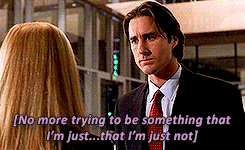
#source:thesirencult#level up journey#leveling up#leverage#level up#divine feminine energy#feminine advice#feminine journey#dark feminine aesthetic#dark femininity#femme fatale#high value mindset#high value woman
74 notes
·
View notes
Text
How a Crisis for Vultures Led to a Human Disaster: Half a Million Deaths. (New York Times)
To say that vultures are underappreciated would be putting it mildly. With their diet of carrion and their featherless heads, the birds are often viewed with disgust. But they have long provided a critical cleaning service by devouring the dead.
Now, economists have put an excruciating figure on just how vital they can be: The sudden near-disappearance of vultures in India about two decades ago led to more than half a million excess human deaths over five years, according to a forthcoming study in the American Economic Review.
Rotting livestock carcasses, no longer picked to the bones by vultures, polluted waterways and fed an increase in feral dogs, which can carry rabies. It was “a really huge negative sanitation shock,” said Anant Sudarshan, one of the study’s authors and an economics professor at the University of Warwick in England.
The findings reveal the unintended consequences that can occur from the collapse of wildlife, especially animals known as keystone species for the outsize roles they play in their ecosystems. Increasingly, economists are seeking to measure such impacts.
A study looking at the United States, for example, has suggested that the loss of ash trees to the invasive emerald ash borer increased deaths related to cardiovascular and respiratory illness. And in Wisconsin, researchers found that the presence of wolves reduced vehicle collisions with deer by about a quarter, creating an economic benefit that was 63 times greater than the cost of wolves killing livestock.
“Biodiversity and ecosystem functioning do matter to human beings,” said Eyal Frank, an economist at the University of Chicago and one of the authors of the new vulture study. “And it’s not always the charismatic and fuzzy species.”
14 notes
·
View notes
Quote
Later in the morning, we broach the thorny topic of teaching children the skills needed to thrive in Russia’s new free-market society.
The physicist talks about how capitalism cannot meet the needs of ordinary Russian people who are used to socialist state protection and security. “Those who are less capable or weaker should not be penalized just because they don’t know how to make money. It’s not humane, and we shouldn’t teach such ideas to children.”
The health expert agrees, “We do not want our children to envy people who have material things and are rich.”
A preschool teacher with brown hair disagrees, “Ulitsa Sezam must include lessons about the free market. Otherwise, our children will not know how to survive.”
Across the table, one history expert exclaims, “Business should not be a bad word in Russian. We need to teach our children to respect people who are doing business because they are a creative part of the new society.”
The antipathy toward capitalism that some educators express is understandable. Most Russians are suffering economically, and no one disputes that inequality in Russia has risen, far surpassing levels experienced under communism. Russian life expectancy has plummeted, along with teachers’ lifetime savings, including many in this room. It’s not surprising they are frightened.
The math teacher shouts across the chasm between the tables, “Russia’s strengths are in math and science, and above all else, we must preserve this strength. We must not succumb to the West’s destructive obsession with capital.”
Another teacher argues, “If the show focuses on money in any way, our children will grow up paying attention to making money, instead of focusing on being socially responsible people.”
Adapting Sesame Street for Russian TV — What Could Go Wrong?
#sesame street#russia#history#soviet union#tv#economics#capitalism#Natasha Lance Rogoff#literature#vulture#book excerpt
0 notes